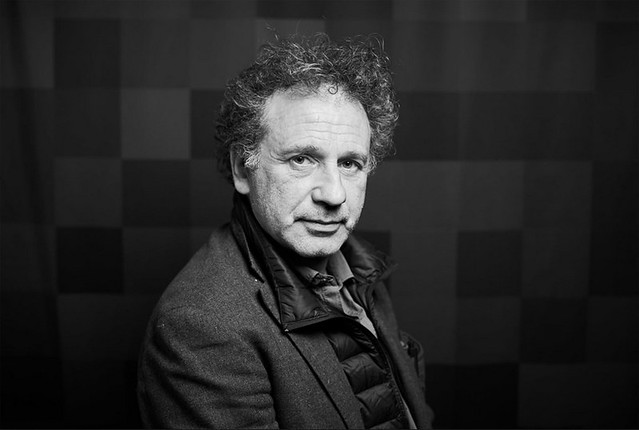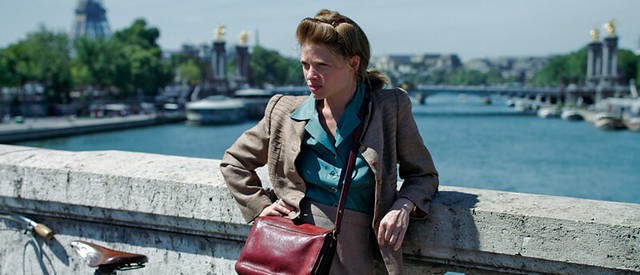
It's a big challenge to adapt a book by one of the literary giants, Margeurite Duras. Known for her enigmatic, erotically charged, fiercely political writings and films, Duras was one of the key figures in the most significant French literary movement in the 20th century - Nouveau Roman. She also scripted Alain Resnais' greatest work, Hiroshima mon amour, which shares many of the themes with Memoir of War.
Luckily for us, French director Emmanuel Finkiel has made a beautiful film here with Mélanie Thierry in her mesmerizing, star turning performance as Duras, based on her semi-autobiographical book, La douleur. I got a chance to talk to Finkiel about his adaptation process and the film's implication on current political climate.
Screen Anarchy: The film is tremendous and very ambitious in presenting very complex story of Margeurite Duras. Are you a big fan of Duras writings and nouveau roman?
Emmanuel Finkiel: I had read that story written by Duras when I was young, about 25 years old and at that time it was a story that had really troubled me. It resonated because with my own family’s history. So when I was approached about adapting the book, I decided to do it right away. I was not at all afraid of taking on such a great literary monument because it resonated with me personally.
Can you tell me more about your family history if you don’t mind?
When my father was only 14, this was 1942, his parents and his younger brother who was 10, got rounded up and arrested. It was called Vel' d'Hiv Round up in July 1942. He never saw them again. After the war was over, even he was made sure that they were not going to return, he always retained that there was a little bit of hope. As a child I witness this in my father – the haunting by the absence of your very close family. He seemed to me to be always waiting and hoping that some day they will come back. I think that aspect – of waiting and hoping and that absence that resonated for me with Margeurite’s story.
I’m so sorry that happened to your family.
How close the film is to the memoir it is based on? Did you have to do a lot of research?
I think that the story that you see in the film is pretty faithful to the novel as any adaptation can be even with the elements of subjectivity involved. But the main difference is that in the book, Margeurite devotes quite a number of pages to the period of time after her husband returned where she really nursed him back to life. I decided that it would be very difficult to show that because I really didn’t know how to show that physical body of Robert on film. He was in concentration camp for so long and completely emaciated and I didn’t know how. So I decided not to deal with that part of the book.
You’ve worked with Mélanie Thierry in your last film Je suis pas un salaud. She is absolutely amazing in this. Rivetting performance. Was she always your choice to play Duras?
Actually even though I worked with her before, I hadn’t thought of her when I was writing this film. It was only through doing screen test as we tested a lot of actresses- when I did the screen test with Mélanie, she really stood out. Because I think that she is really capable of encompassing the kind of strength that was needed for the role but at the same time has real fragility. I knew that she was ready to meet this heroine, this character of Margeurite head on because she was able to find goods through her personal experience of suffering. The kind of depth that was needed, even though she’s very petit and fragile and caring woman.
She is absolutely fantastic in this film. I always thought of her as just another pretty face but she really really pulled it off and I am very glad you chose her.
Your experience with her was pretty much the same as with the French audiences. Nobody expected that much depth, everyone just thought she was just a pretty face.
Right.
So, you are not alone.
With Rabier the nazi collaborator, played by Benoit Magimel, and the cat and mouse chase that ensues between Rabier and Duras, is the same powerplay that you see in her other writings. You think it was Duras as a writer using the creative license or did that really happen?
I think that like much of Duras’ writing, this is also based on reality and real people she knew but she put them in a fictional cast. So she added things that were not real. So for example, I think that the character of Rabier mostl likely in real life was much more dangerous person and she had much more fear in her dealings with him but that’s not how you see him in the film. I think that she in a way chose to put this fictional cast- a romanesque (fictional) view of it rather than dealing with harsher reality.
And also think that when she writes her relationship with Rabier, there is kind of eroticism that emerges from it. I think this is very important because it generated a lot in her later writings which is the whole idea of shame.
Yes.
And that she behaved the way she did. And she carries her shame with her and it’s evident in a lot of her writing.
Right. Guilty conscience.
I think that it may have been the fact that she experienced kind of excitement whenever she met with Rabier at the same time she was waiting for her husband. Hence the feeling of shame and as you say guilt.
What’s also important is that she created someone who is not black and white. Many of the characters in her work are not black and white characters- they are very very complex who carry a great deal of contradiction in them. She talks to them almost mockingly with disdain but at the same time feels guilty about talking to them. None of her characters are simple.
There is a certain distance she keeps. There’s her seeing things objectively as if she is observing the scene as a bystander. We see this with only her in focus while everyone is out of focus. I am wondering if that also plays into what we are talking about.
Actually, the focus on her and everything somewhat blur is an indication of her subjectivity. Because what we are seeing in the film is not this woman living her day to day life in Paris under the occupation. It’s how she sees herself during that time and what her vision is of her life and her position that we are seeing. And that was what was reflected in those shots.
It makes sense.
I think you are correct in saying that she has this distance. But that’s not only the distance between herself and others around her. It’s the whole world and the whole situation and her in it that she is keeping distance from.
The epilogue that follows the end of the film that she left her husband after he came back. The very same person whom she waited for years. Why do you think that is?
In the book early on, she writes “I already decided to leave him.” She had decided to leave him even before he was arrested. So what becomes interesting is what she is waiting for. She is not actually waiting for Robert himself. She is waiting for the idea of Robert that she has created for herself. Like my father waiting for his family, once the person is no longer there your imagination takes over and that imagination creates a person who is not the real person but an object with whom you eventually fall in love. I think that was the case with Margeurite. She was so in love with the idea of Robert rather than Robert himself that she was planning to leave.
The French title is La douleur/The Pain – which seems much more correct I feel. The pain the character feels is the same pain in Hiroshima Mon Amour, caused by war – the survivor's guilt that destroys a sense of self.
Tell me if I am wrong, because I thought about the correlation between La douleur and Je suis pas un salaud where you touch upon our current society and economic injustice and racism. I thought about the war raging in Syria, Palestine and the middle east where we see destruction and hopelessness. I was wondering if you had our current society in mind when you made this film?
I am in 100 percent agreement with what you say. I think that you can find the thematic link between my previous film and this film perhaps. Regarding the title, I think that you are correct. Even though I don’t speak English, the way I understand it, the French title is much more effective. It’s stronger and it has kind of density. It is closer to what we see unfold.
This idea of shame and guilt and how we can live with it – I think that is very important and it carries on to the situation we see today. so there is that thematic link.

